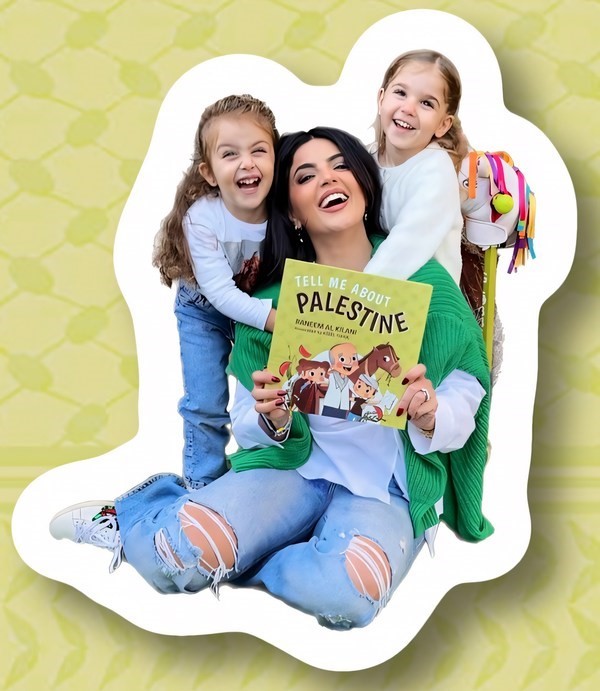Raising kids’ awareness through books can be challenging
during this digital era. However, Raneem Al Kilani, a proud mother, and a
dedicated Jordanian writer takes us all on a magical adventure, introducing the
19 cities of Palestine through her recently-launched book “Tell Me about
Palestine,” illustrated creatively by Aseel Tuhul.
اضافة اعلان
In an interview with
Jordan News, Kilani said “The story,
featuring Uncle Omar, Kamil the horse, and two young adventurers Adam and Sara,
celebrates the rich cultural heritage of Palestine. It is a blend of
entertainment and education, aiming to instill pride in one's roots and create an
enduring connection between generations.”
Kilani shared her excitement about the celebration of
“Palestine's beauty and diversity with readers of all ages.”
She said that what inspired her to write the book was a
moment of “recognizing that there is a lack in children's literature about
Palestine, especially for those raised far from their homeland.”
“As a mother, I wanted to fill that gap and provide a
meaningful connection for children to Palestine,” Kilani contented, adding
“This story is crafted to connect different places on the map, presenting an
enchanting method for young readers to discover the cities of Palestine.
Alongside this, it strives to instill a strong sense of pride in their cultural
heritage and origins.”
On the targeted age groups, Kilani stated “The book is designed for readers
aged 6 and above, but it truly caters to everyone—from kids to adults.”
She explained that parents enjoy the book just as much as
their kids.
Kilani spent about two years writing the book, “though the
process wasn't continuous,” she said.
She added that “the most enjoyable part of the journey was
the research phase, delving into the rich history and culture of the 19 cities
of Palestine.” “Writing the book became a joyous experience as I learned so
much along the way, making the entire process both educational and fulfilling,”
Kilani said.
About the characters, the writer explained that “Sara and Adam are familiar
names, while Uncle Omar brings a sense of wisdom and tradition, and Kamil
represents loyalty,” wishing to create a “personal connection for the readers.
The horse was featured in the story in the name Kamil,
symbolizing “loyalty, companionship, and the enduring spirit of the Palestinian
people”, according to Kilani, who added, “also the name itself means 'perfect'
or 'complete,' further emphasizes the idea that the horse embodies essential
qualities that contribute to the richness and completeness of the Palestinian
cultural narrative.”
The horse was used as the means that took the characters
across the cities of Palestine. For that, Kilani said, “I chose a horse because
it represents tradition, a deep connection to the land, and a slower, more
thoughtful pace.”
She added “This decision reflects a timeless adventure,
emphasizing the importance of a deeper and more personal exploration of culture
and heritage. Plus, for the young readers, there's something magical and
exciting about having a horse take them on this journey!
Moreover, Kilani pointed out “I did my best to cover as much
as I could about the cities of Palestine in the book…There's a wealth of
knowledge about the Arab world, and I hope the book inspires readers to explore
and learn more about this culturally rich region on their own.”

Considering her book to fall within the
short story genre, Kilani explained
“Growing up, our grandparents would share short stories about beautiful
Palestine, creating a tradition for us. Short stories are like snapshots of our
culture, capturing traditions and values simply and memorably. They help us
understand and keep our rich heritage alive.”
She also indicated that there is an increasing demand for books that help teach
kids about Palestine, “especially in the current circumstances.”
Launching the book in this sensitive
time, while the war on Gaza has lasted for around four months, Kilani said “Everyone
plays a role in raising awareness. Releasing the book was a way to reach as
many people as possible and contribute to teaching and understanding.”
She added “A key motivation for me was to emphasize the
importance of educating the younger generation. By instilling a strong
connection to Palestine at a young age, we empower them to carry the cultural
legacy forward. Teaching them early not only fosters understanding but also
ensures that they grow with a profound connection to their roots.”
Kilani would be donating proceeds coming from the book to
support the education of students from Gaza based in Jordan, indicating “It is
my way of contributing to a cause that holds great importance, especially in
these challenging times.”
On the illustrations, Aseel Tuhul, the illustrator of the book, told Jordan
News “I sat with Raneem to elaborate more on the characters, and that is how I
imagined them.”
“I intended to add the Arabic features to the characters,
such as the brown hair and the white or brown skin color. The grandfather also
has thick eyebrows and a belly to reflect the typical image of Palestinian
elderlies.” Tuhul stated.
Tuhul also said, “The whole story was enjoyable to draw, but
the city I enjoyed drawing was Tulkarm, where I descend from.”
“Tulkarm holds a special place in my heart, as my family
embraces the city’s traditions, such as making ‘Musakhan’, a popular dish in
the city,” Tuhul added.
She also explained that the setting of the story was really
exciting to draw, “starting the story at daytime, and ending it at nighttime.”
Adding the collective pain of Israel’s war on Gaza, she
added that it gave her even more motivation to finish in these times, adding
that this piece of art, even small, can contribute to making an impact.
Read more Books
Jordan News





